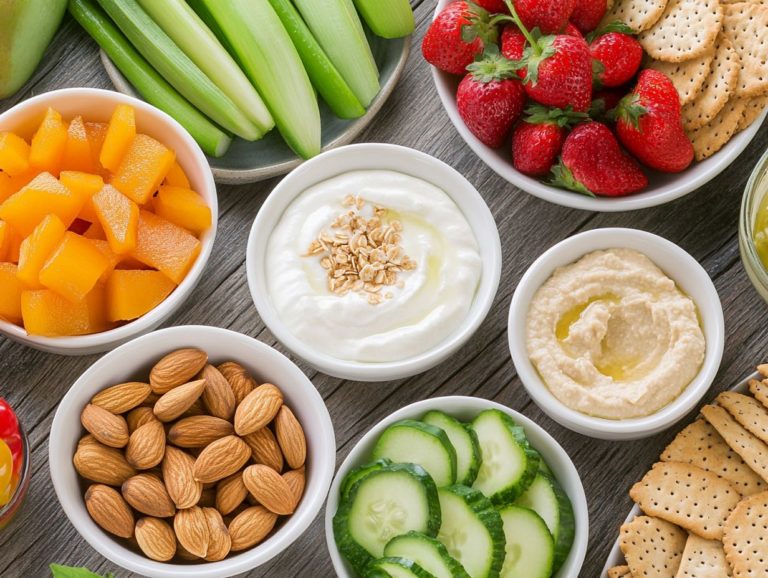Meal Planning for Athletes: What to Know
For athletes, the right nutrition is as vital as rigorous training. Meal planning not only fuels your performance but also supports recovery and enhances overall health!
This article delves into the unique nutritional needs you face as an athlete, breaking down essential macronutrients and micronutrients. You ll discover how to craft an effective meal plan tailored specifically to your sport whether you thrive as an endurance runner or excel as a power lifter. Get ready to discover how the right meals can fuel your success!
Moreover, you ll find practical meal prepping tips to help you stay on top of your nutrition. Uncover how to optimize your meals for peak performance and take your athletic journey to the next level!
Contents
- Key Takeaways:
- The Importance of Meal Planning for Athletes
- Nutritional Needs for Athletes
- Creating an Effective Meal Plan
- Meal Planning Strategies for Different Types of Athletes
- Meal Prepping for Athletes
- Frequently Asked Questions
- What does meal planning for athletes entail?
- Why is meal planning important for athletes?
- How many meals should athletes have in a day?
- What are some key nutrients that should be included in an athlete’s meal plan?
- Should athletes have different meal plans for training and rest days?
- Are there any specific foods that athletes should avoid in their meal plan?
Key Takeaways:
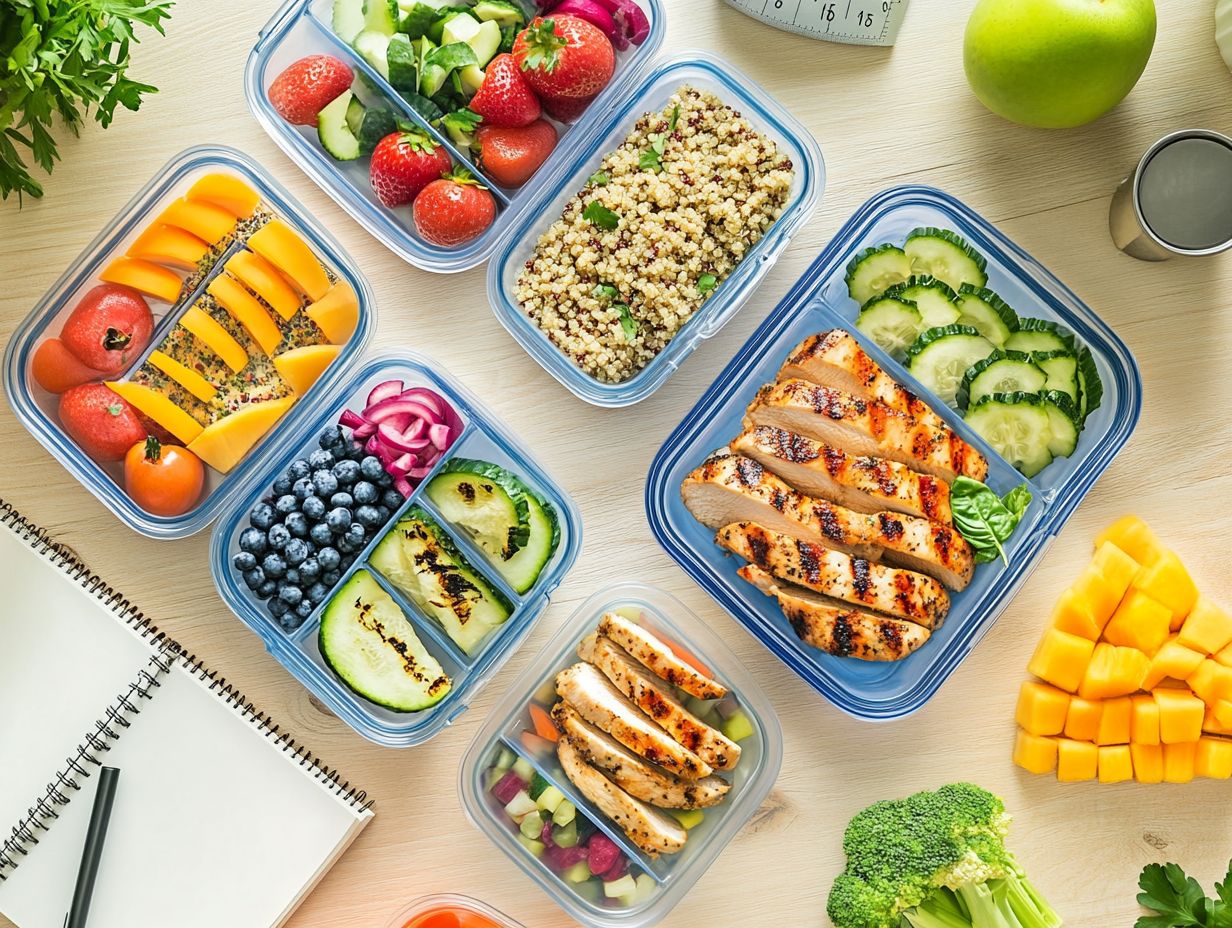
- A well-planned diet is your secret weapon for peak performance.
- Understanding your unique nutritional needs is crucial for success.
- Tailor your meal plan to balance training demands and personal preferences for optimal results.
The Importance of Meal Planning for Athletes
Meal planning is essential for you as an athlete, significantly impacting your performance by ensuring that you meet both your energy needs and nutritional requirements.
A thoughtfully crafted meal plan optimizes your macronutrient intake carbohydrates, protein, and healthy fats all of which are vital for sustaining high-intensity exercise.
These macronutrients are the nutrients your body needs in larger amounts. Carbohydrates act as your primary energy source, while protein plays a vital role in muscle recovery and growth. Healthy fats offer sustainable energy during prolonged efforts.
Following dietary guidelines helps you maintain nutrient quality and make better choices for your pre-workout and post-workout meals.
How Proper Nutrition Impacts Performance
Proper nutrition maximizes your athletic performance. It influences your energy levels and recovery times after workouts.
As an athlete, it s crucial for you to understand how different macronutrients contribute to your overall capabilities. Carbohydrates fuel high-intensity activities, while protein aids muscle repair and growth after strenuous training sessions. Healthy fats provide long-lasting energy.
For optimal performance, you can take advantage of nutrient timing strategies. Savor a carbohydrate-rich meal before an event for a quick energy boost or incorporate protein soon after a workout to enhance your recovery.
By strategically planning your intake of these macronutrients, you can elevate your performance and speed up your recovery.
Nutritional Needs for Athletes
Athletes possess distinct nutritional requirements that set them apart from the average person. To meet the intense demands of their training and enhance their athletic performance, they need a meticulously balanced intake of both macronutrients and micronutrients.
Macronutrient and Micronutrient Requirements
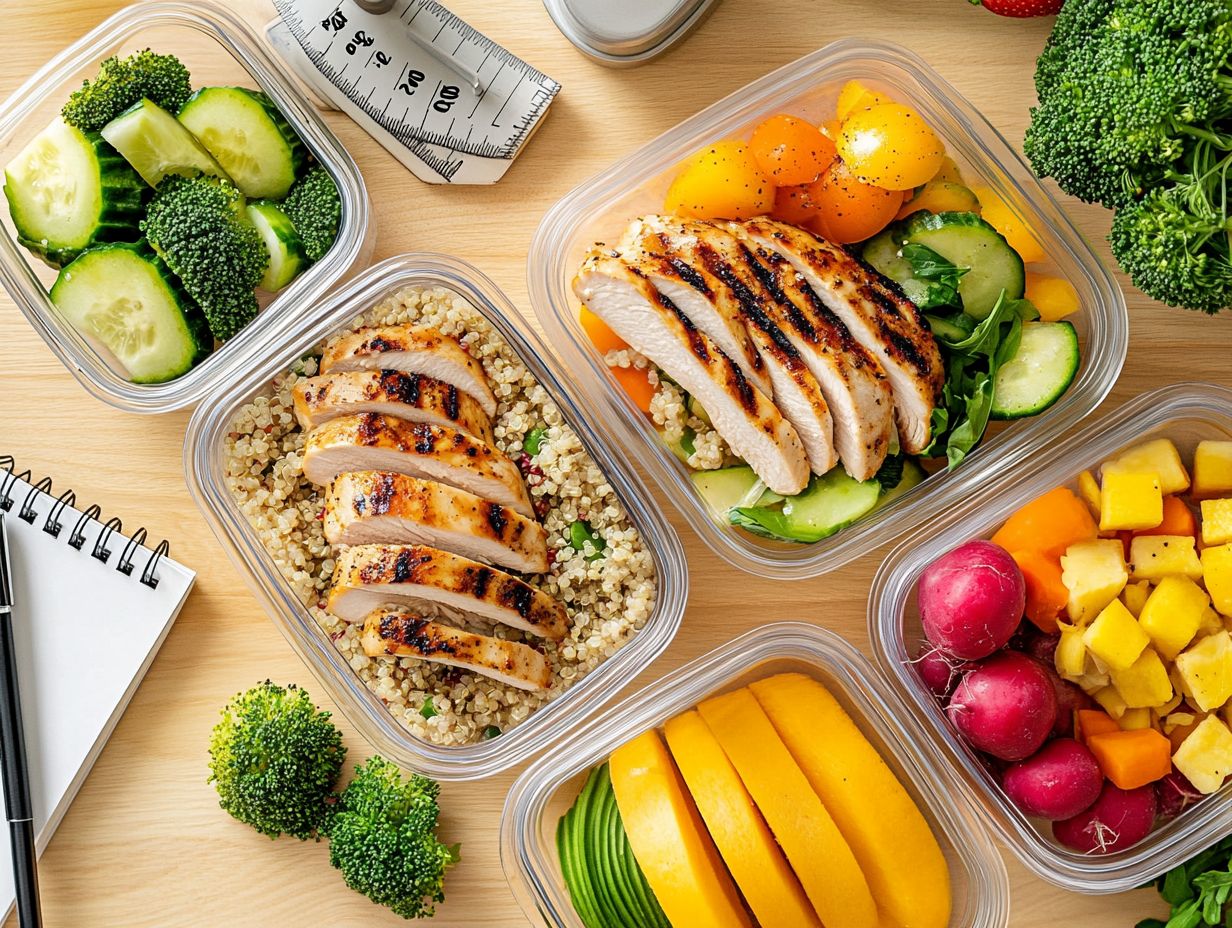
Understanding your macronutrient and micronutrient requirements is crucial if you’re looking to elevate your athletic performance, enhance recovery, and maintain overall health.
By fueling your body with the right balance of carbohydrates, proteins, and fats, you can significantly boost your strength, endurance, and overall efficiency. Carbohydrates act as your primary energy source for intense workouts, while protein intake is vital for muscle recovery, promoting repair and growth. Healthy fats are essential for long-term energy needs and play a key role in hormonal functions.
A well-rounded diet with a rich array of micronutrients is equally important. These nutrients support various physiological functions, such as immune health and muscle contraction, ensuring you consistently perform at your best.
Start planning your meals today to secure your athletic edge!
Creating an Effective Meal Plan
Ready to take your performance to the next level? Crafting an effective meal plan can be your secret weapon! An effective meal plan for athletes requires a careful balance of energy needs and when to eat certain nutrients for best results, all aimed at enhancing performance and promoting recovery. You ll be amazed at how much better you ll perform when you ensure that each meal is rich in essential macronutrients and micronutrients, setting the stage for optimal results on and off the field.
Factors to Consider
When you re crafting a meal plan for athletes, several critical factors come into play. First, consider energy needs, dietary guidelines, and nutrient quality to ensure optimal performance.
You also need to account for the athlete’s training schedule. Their caloric and nutritional requirements can fluctuate significantly based on the intensity and duration of their workouts. Age and gender are pivotal in determining specific dietary needs; younger athletes often require different macronutrient ratios compared to their older peers.
The sport itself greatly influences food choices. For instance, endurance athletes might prioritize carbohydrates for energy, while those focused on strength may need to ramp up their protein intake to support muscle repair and growth.
By adhering to established dietary guidelines, athletes not only meet their energy demands but also obtain the vital vitamins and minerals essential for recovery and overall health.
Meal Planning Strategies for Different Types of Athletes
Effective meal planning strategies vary greatly depending on the type of athlete you are. Whether you’re an endurance athlete or a strength athlete, it’s crucial to adopt a tailored approach to nutrition that meets your unique performance requirements.
Understanding your specific needs will enable you to optimize your meals for the best results.
Endurance Athletes
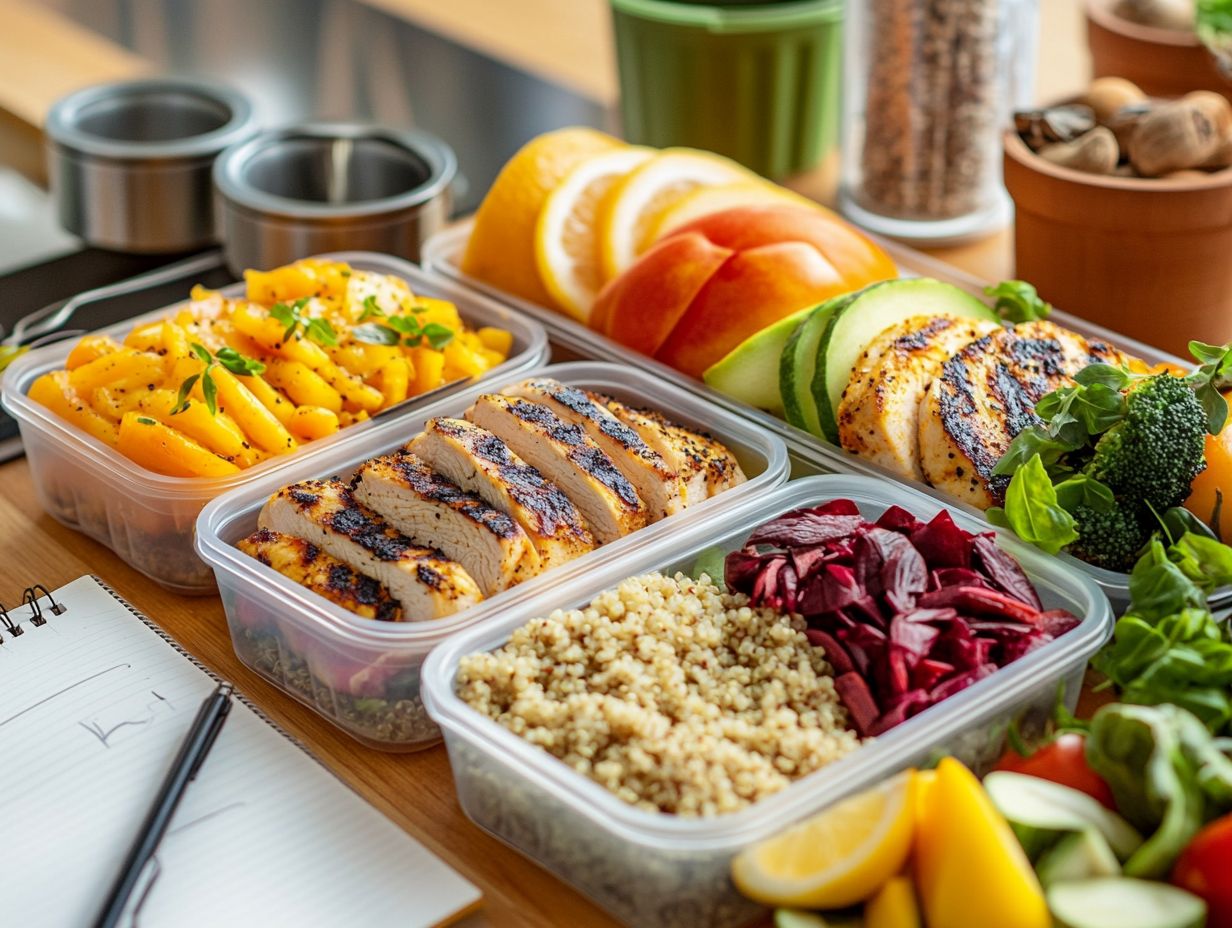
For endurance athletes, a meal plan rich in carbohydrates is vital to meet energy needs during prolonged physical challenges and to support effective recovery.
As you tackle your demanding training schedule, prioritizing carbohydrate loading before events is key. Maximizing your glycogen stores the body’s energy reserves that fuel your workouts is essential. You can easily do this by incorporating foods like quinoa, which is renowned for its high carbohydrate content and protein benefits.
Don t overlook hydration; it plays a pivotal role in your performance. Regular water intake, paired with electrolyte-replenishing beverages, is crucial for keeping you at your best.
After your training sessions, focus on post-training meals that include a balanced mix of carbohydrates and proteins. Options like chickpeas and a variety of vegetables will help facilitate muscle recovery and replenish those essential nutrients you ve lost.
Strength and Power Athletes
Strength and power athletes need a meal plan that prioritizes high protein intake and balanced macronutrients to support muscle recovery and development.
To truly maximize your performance, consider incorporating a variety of protein sources into your diet. Lean meats are essential as they offer the amino acids crucial for muscle repair, while Greek yogurt stands out for its impressive protein content and probiotics that aid digestion.
Meal timing is crucial for recovery; consuming protein-rich foods after your workouts can significantly enhance muscle recovery and promote strength gains. By strategically planning your meals around training sessions, you can optimize nutrient absorption and fuel your body for peak performance, ensuring you effectively hit your strength goals.
Meal Prepping for Athletes
Meal prepping is an invaluable asset for athletes, enabling you to expertly manage your nutrition. By preparing wholesome meals and snacks in advance, you can ensure that your energy needs are met with precision and ease.
Tips and Tricks for Easy and Nutritious Meal Prep
Using easy and healthy meal prep ideas can significantly elevate your ability to enjoy a balanced diet that fuels your life and achieve your nutritional goals.
By adopting a systematic approach to meal preparation, you can take charge of your nutrition. This ensures every dish is brimming with essential nutrients for peak performance.
Focusing on bulk cooking allows you to whip up multiple servings at once, saving you time and reducing the temptation to reach for less healthy options on those hectic days.
Choosing ingredients that are both satisfying and diverse is essential think whole grains, lean proteins, and vibrant vegetables. Using good storage methods, like airtight containers and clear labels, keeps your meals fresh and makes it easy to grab food on the go.
Add variety to your meals to keep them exciting and help you get a wider range of vitamins and minerals, which are crucial for recovery and maintaining energy levels.
Frequently Asked Questions
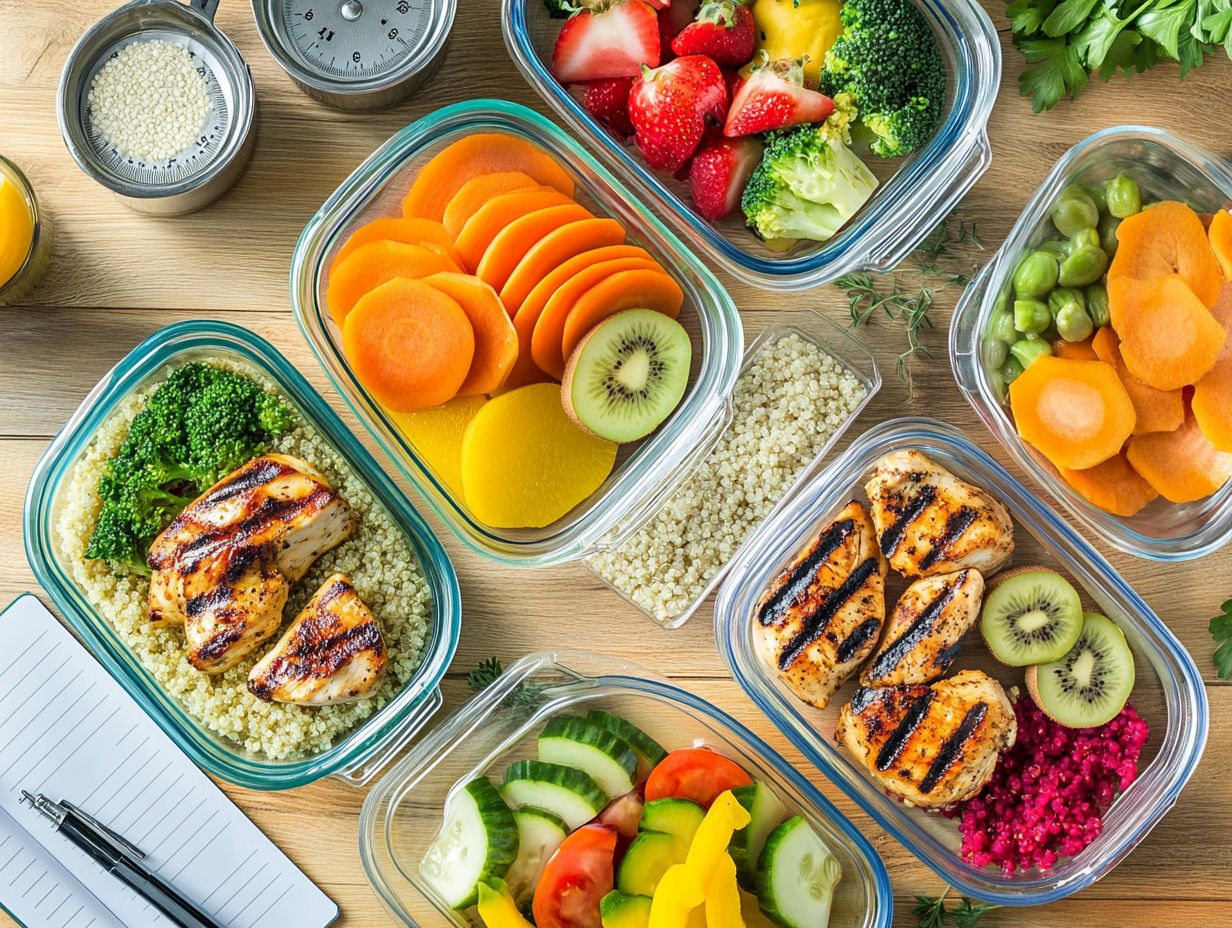
What does meal planning for athletes entail?
Meal planning for athletes involves creating a structured and well-balanced eating plan tailored specifically to the needs of an athlete’s training schedule, sport, and body composition goals, following nutrition for athletes: essential guidelines.
Why is meal planning important for athletes?
Meal planning helps athletes maintain proper nutrition for athletes to ensure optimal performance, prevent fatigue and injury, and achieve their fitness and body composition goals.
How many meals should athletes have in a day?
The number of meals an athlete should have in a day depends on their individual needs and training schedule. However, typically, athletes should aim for 3 main meals and 2-3 snacks to fuel their bodies properly.
What are some key nutrients that should be included in an athlete’s meal plan?
Protein, carbohydrates, healthy fats, and a variety of vitamins and minerals are all essential for an athlete’s meal plan. The specific amounts and sources of these nutrients may vary depending on the individual’s needs and sport.
Should athletes have different meal plans for training and rest days?
Yes, typically, athletes should have different meal plans for training and rest days to ensure they are properly fueling their bodies for their level of physical activity. On training days, meals should be higher in carbohydrates and protein to support energy and muscle recovery. On rest days, meals can be slightly lower in carbohydrates and higher in healthy fats and vegetables.
Are there any specific foods that athletes should avoid in their meal plan?
There are no specific foods that athletes should entirely avoid; however, they should limit their intake of processed and high-sugar foods, as well as alcohol. These can negatively affect performance and recovery.





